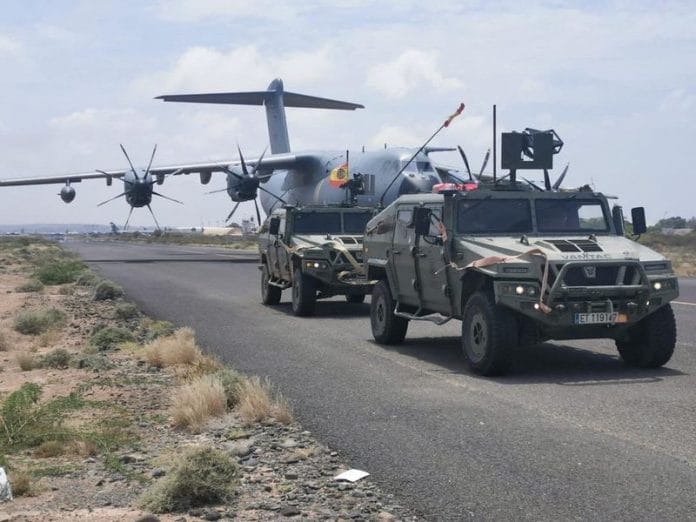By Khalid Abdelaziz and Aidan Lewis
KHARTOUM (Reuters) – Europe, China and Japan raced to extract citizens from Sudan on Monday as the U.N. chief warned of the risk of “a catastrophic conflagration” with wider repercussions and urged international powers to exert maximum pressure for peace.
Foreign evacuations included a 65-vehicle convoy with dozens of children among diplomats and aid workers on an 800-km (500-mile), 35-hour journey in searing heat from the embattled capital Khartoum to Port Sudan on the Red Sea.
The eruption of violence between the military and the Rapid Support Forces (RSF) paramilitary group on April 15 has killed at least 427 people, knocked out hospitals and other services and turned residential areas into war zones.
U.N. Secretary-General Antonio Guterres warned a session of the U.N. Security Council in New York that the violence “risks a catastrophic conflagration within Sudan that could engulf the whole region and beyond”.
He urged the 15 Council members to use their clout to end the violence and return Sudan to the path of democratic transition.
“We must all do everything within our power to pull Sudan back from the edge of the abyss … We stand with them at this terrible time,” he said, adding he had authorized temporary relocation of some U.N. personnel and families.
U.S. Secretary of State Antony Blinken said Washington was in close touch with Sudanese military leaders and pressing them to fully implement ceasefire deals, as well as exploring options to return a U.S. consular presence to Sudan as soon as possible.
Tens of thousands of people, including Sudanese and citizens from neighbouring countries, have fled in the past few days, including to Egypt, Chad and South Sudan, despite instability there.
SCARCE FOOD, ELECTRICITY, WATER
“There is still a challenge in accessing food, there’s still a challenge accessing electricity and water and that is prompting people to move,” said Farid Aiywar, Sudan head for the International Federation of the Red Cross and Red Crescent.
For those remaining in Africa’s third largest country, where U.N. agencies say a third of the 46 million population needed aid even before the violence, the situation was increasingly bleak.
Facing attacks, aid organisations were among those withdrawing staff and the World Food Programme has suspended its food distribution mission, one of the largest in the world.
Clean water and fuel were becoming harder to come by in Khartoum, with electricity and internet services patchy. Residents have been sharing resources.
Evacuations picked up during a partial lull in fighting between the army and the RSF, but few expected the relative slowing of army air strikes, artillery barrages, and gunbattles with the RSF in residential neighbourhoods to last once the international evacuation operations were complete.
“It’s not fair that all foreigners are leaving the country in these circumstances,” said Finnish Foreign Minister Pekka Haavisto, adding that by disengaging diplomatically, the West risked allowing rival Russia to gain more influence in Sudan.
Several nations, including Canada, France, Poland, Switzerland and the United States have halted embassy operations until further notice.
By Monday afternoon, fighting was beginning to pick up again. Air strikes and ground fighting could be heard in Omdurman, Khartoum’s sister city on the opposite bank of the Nile river, and there were also clashes in the capital, a Reuters reporter said.
A large cloud of dark smoke could be seen near the international airport in central Khartoum, adjacent to army headquarters, and booms of artillery fire shook the surroundings.
There has been little change in the pattern of fighting with the RSF spread through neighbourhoods and the army, deployed in more limited areas, using air strikes on their rivals.
EVACUATION MISSION
Nations including Gulf states and Russia were trying to get citizens out on Monday. Diplomats have been targeted in attacks, and at least five aid workers killed.
Despite sustained pressure from countries concerned by the conflict’s wider reverberations as well as the safety of their nationals, the two sides have not abided by temporary truce deals.
However fighting calmed enough over the weekend for the United States and the United Kingdom to get embassy staff out, triggering a rush of evacuations of hundreds of foreign nationals by other countries.
Families with children crowded into Spanish and French military transport planes, while a group of nuns were among the evacuees on an Italian aircraft, photographs showed.
At least two convoys involved in evacuations came under attack at the weekend, including one carrying Qatari embassy staff and another carrying French citizens, one of whom was injured.
Several countries sent military planes from Djibouti to fly people out from the capital, including to Port Sudan where some have boarded ships to Saudi Arabia.
RISK OF WIDER CONFLICT
The army and RSF jointly staged a coup in 2021 but fell out during negotiations to integrate the two groups and form a civilian government four years after long-ruling autocrat Omar al-Bashir was toppled.
Their rivalry has raised the risk of outside powers being drawn in: Sudan has seven direct neighbours and sits strategically between Egypt, the Red Sea and the Sahel.
Beyond the capital, people are reported to have fled clashes in several areas including the western region of Darfur, as well as from Blue Nile State on the border with Ethiopia and South Sudan, and North Kordofan State southwest of Khartoum, according to a U.N. update.
South Sudan won independence from Sudan in 2011, after a decades-long civil war. Since independence the new country has been beset by its own civil war, and refugees had previously spilled into its northern neighbour.
(Reporting by Khalid Abdelaziz in Khartoum; Aidan Lewis in Cairo; Sabine Siebold and Martin Schlicht in Berlin and Simon Johnson in Stockholm; Writing by Frank Jack Daniel and Mark Heinrich; Editing by Philippa Fletcher)
Disclaimer: This report is auto generated from the Reuters news service. ThePrint holds no responsibilty for its content.






